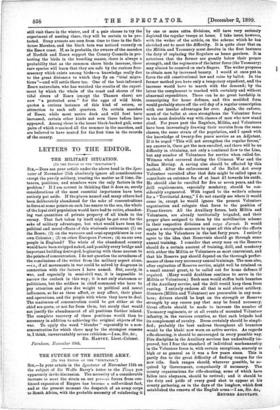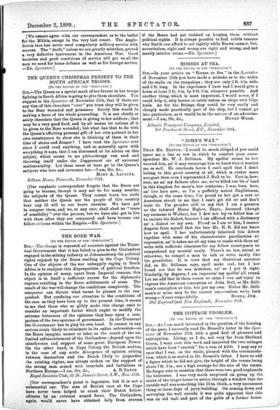THE FUTURE OF THE BRITISH ARMY.
[TO THE EDITOR OF THE "SPECTATOR."] Si,—In your article in the Spectator of November 11th on the subject of Sir Wolfe Barry's letter to the Times you apparently invite discussion. The necessity of a considerable increase to meet the strain on our present forces from con- tinued expansion of Empire has become a self-evident fact, and at the present moment the despatch of an army corps to South Africa, with the probable necessity of reinforcing it by one or more extra divisions, will have very seriously depleted the regular troops at home. I take issue, however, with the writer of the article, on the scheme which he has sketched out to meet the difficulty. It is quite clear that on the Militia and Yeomanry must devolve in the first instance the duty of replacing the Regulars as home garrison. It is notorious that the former are greatly below their proper strength, and the regiments of the latter force (the Yeomanry) may almost be counted on one's fingers. The writer proposes to obtain men by increased bounty. I would at once put in force the old constitutional law and raise by ballot. In the former method you have only a temporary expedient, and the increase would have to march with the demand; by the latter the complement is reached with certainty and without abnormal expenditure. There can be no great hardship in conscripting for home defence, and this modified form would probably stave off the evil day of a regular conscription with our insular advantages for ever. Again, the enforce. ment of the ballot at once strengthens the Volunteer force in the most desirable way with classes of men who now stand aloof. For years past the Regulars, Militia, and Volunteers have been increasingly drawing their recruits from the same classes, the same strata of the population, and I speak with the knowledge of twenty-five years' service as an Adjutant. If it be urged "This will not strengthen the regular forces," my answer is, Once get the men enrolled, and there will be no difficulty in obtaining, not only a continual flow to the Line, but any number of Volunteers for service when called for. Witness what occurred during the Crimean War and the Indian Mutiny. A saving also should be effected by this method. After the enforcement of the Ballot Act every Volunteer recruited after that date might be called upon to contribute an entrance fee of at least £1 towards his outfit. He should also be enrolled for five or seven years, and the drill requirements, especially musketry, should be con- siderably augmented. With regard to the writer's scheme for a "Territorial Army," I do not exactly see where it would come in, except he would ignore the present Volunteer organisation and relegate that force to the position of Franc-tireurs. All the Auxiliary forces, both Militia and Volunteers, are already territorially brigaded, and their proper place assigned to them by the mobilisation scheme in their respective divisions and corps d'armee. It would appear a retrograde measure to upset all this after the efforts made by the Volunteers in the last forty years. I entirely agree to the idea that Reservists should go through some annual training. I consider that every man on the Reserve should do a certain amount of training, drill, and musketry with either the Militia or Volunteers as most convenient, and that his Reserve pay should depend on the thorough perfor- mance of these very necessary annual trainings. The men also, after expiration of Reserve service, might well be retained on a small annual grant, to be called out for home defence if required. (Many would doubtless continue to serve in the Militia or Volunteers.) Such men would stiffen both branches of the Auxiliary service, and the drill would keep them from rusting. I entirely endorse all that is said about artillery. Gunners (Militia and Volunteer) are procurable in any num- bers; drivers should be kept on the strength or Reserve strength by any excess pay that may be found necessary. Great efforts should be made to increase the number of Yeomanry regiments, or at all events of mounted Volunteer infantry, in the various counties, so that each brigade had its complement of cavalry. Dress certainly should be simpli- fied ; probably the best undress throughout all branches would be the khaki now worn on active service. As regards rifle-shooting, it should be encouraged in every possible way. Fire discipline in the Auxiliary services has undoubtedly im- proved, but I fear the standard of individual marksmanship in the Volunteer force is, with certain exceptions, scarcely so high or so general as it was a few years since. This is partly due to the great difficulty of finding ranges for the new rifle. Such ranges should, wherever possible, be ac- quired by Government, compulsorily if necessary. The county organisations for rifle-shooting, some of which have fallen into abeyance, should be revived ; and it should be the duty and pride of every good shot to appear at his county gathering, as in the days of the longbow, which first established the renown of the English arms.—I am, Sir. &c.,
RETIRED ADJUTANT.
[We cannot agree with our correspondent as to the ballot for the Militia, except in the very last resort. The Anglo- Saxon race has never used compulsory military service with success. The "draft," unless we are greatly mistaken, proved a very defective instrument in the American War. Good bounties and good conditions of service will get us all the men we need for home defence as well as for foreign service. —ED. Spectator.]























































 Previous page
Previous page